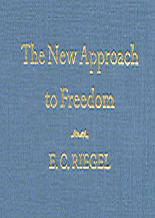 Home Page
Home Page Open PDF Version
Open PDF Version Purchase Hardcopy
Purchase Hardcopy
 THE NEW APPROACH TO FREEDOM
THE NEW APPROACH TO FREEDOMTogether with Essays on the Seperation of Money and State by E. C. Riegel Edited by Spencer Heath MacCallum THE HEATHER FOUNDATION
Copyright © 2003 The Heather Foundation |
||
|
||
|
THERE ARE three classes of socialists: the left-wing, or Marxist, group, who believe that the government should own and control everything; the middle-of-the-road socialists, who believe the government should own and operate public utilities; and the right-wing socialists, who believe that the government should control only the monetary system. The right-wing socialists are by far the most dangerous, because they are not known as socialists and call themselves capitalists, individualists, private enterprisers, etc. They even believe themselves to be anti-socialist and profess full faith in private enterprise. They are not only numerically the largest group of socialists but are also individually the most influential. Among them are the leading industrialists and mercantilists and bankers and statesmen. The right wing socialists believe that with production and distribution facilities in the ownership and operation of private interests, and with monetary facilities in the hands of government, we can have free enterprise. They might as well believe that if a man owns an automobile, he need not worry about who or what controls the gas. Private enterprise means the right among men to come to voluntary agreement on the exchange of their goods and services. These agreements, some written, some oral, some implicit, some explicit, run into the millions, and upon their fidelity rests the entire social structure. In a money economy, all these contracts are expressed in terms of the monetary unit, which is itself based upon a contract—the basic contract which is the foundation of the entire pyramid of contracts. What is the money contract that makes possible or impossible the faithful performance of every other contract? Ask any businessman, banker, lawyer, economist or statesman, and you will find that his idea is not only vague, but that it involves legislation. In other words, he believes that money is a political product. In contrast with this universal belief, the truth is that the state is incompetent to legislate money and powerless to issue it. The substance of money is supplied entirely by private enterprise. The state's intervention in money is at best an impediment to private enterprise, and with the assertion of the issue power, it becomes the active agent of socialization. Thus those who believe in or accept political money power—and their number is legion—are the most dangerous, though innocent, socialists. While the great mass of people have no ideology, those who think on the issue between private enterprise and socialism are virtually all socialists of the three classes named. This is a startling fact that we must recognize before the final battle lines are formed. The would-be friends of private enterprise must be made real friends, instead of innocent fellow travelers with those who would destroy our liberties. Private enterprise, to survive, must control its three facilities, namely, the means of exchange, the means of production, and the means of distribution. To control the means of exchange, we must have separation of money and state. |
||